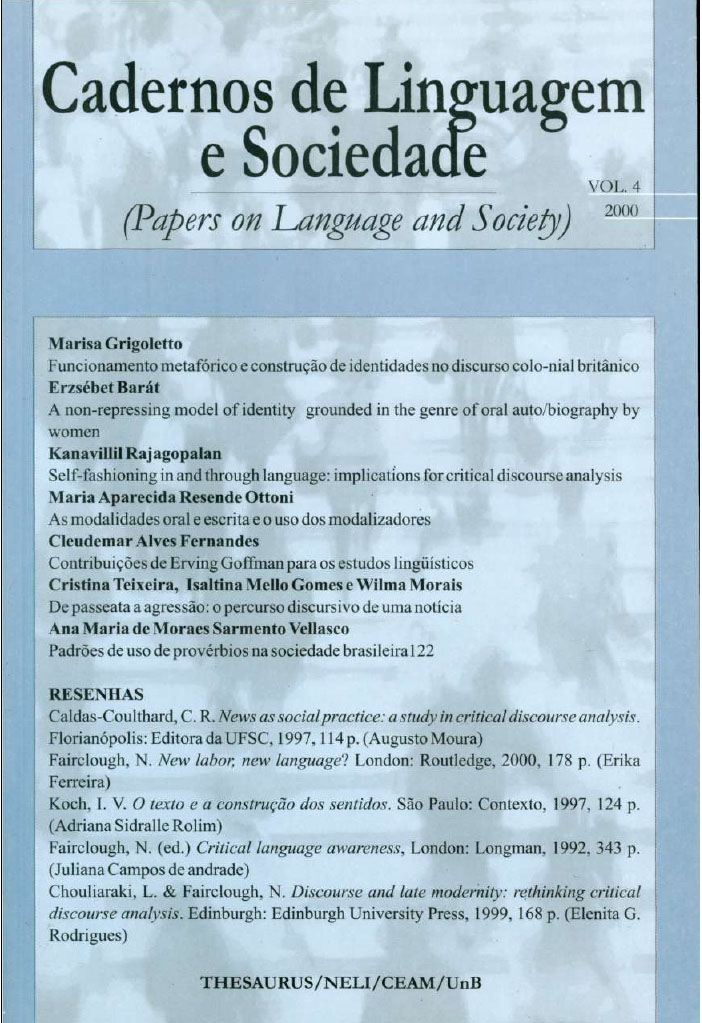Self-fashioning in and through language
implications for Critical Discourse Analysis
DOI:
https://doi.org/10.26512/les.v4i0.6488Palavras-chave:
Critical discourse analysis, Self-fashioningResumo
Critical Discourse Analysis, the way I see it, is predicated upon the premise that discourse is not merely about a language-external reality, but is a means of critically intervening in that very reality. A major challenge to the interventionist thesis is the idea of “selffashioning”, enthusiastically endorsed by contemporary neo-progmatists for whom all talk of language impinging on reality is useless philosophical golbbledygook. The pragmatist rejection of language as representation leaves no room for any critical intervention. The question I would like to pose is: Is there anything in the notion of self-fashionning that can still be salvaged and grafted on to the project of CDA ?
Downloads
Referências
anzaldúa, g. Borderland/La frontera: the new mestiza. San Francisco: aunt Lute, 1987.
Bourdieu, P. ‘Vive la crise!’: for heterodoxy in social science. Theory and Society, 17(5):773-787, 1988.
Giddens, a. Modernity, history, democracy. Theory and Society, 22(2): 289-92, 1993.
Hammersley, M. on the foundations of critical discourse analysis. Language and Communication, 17(3): 237-248, 1997.
Lacoue-Labarthe, P. and J-L nancy. The nazi myth. Critical Inquiry, 16(2): 291-312, 1990.
Rajagopalan, K. Critical discourse analysis and its discontents. CLSL Working Paper, 72. Lancaster: Lancaster University, 1995.
Rajagopalan, K. Lingüística e a política de representação. Estudos Lingüísticos, XXVII, (anais do XLV geL): 342-347, 1998a.
Rajagopalan, K. on the theoretical trappings of the thesis of anti-theory; or, why the idea of theory may not, after all, be all that bad: a response to gary Thomas. Harvard Educational Review., 68(3): 335-352, 1998b.
Rajagopalan, K. Cognitive vs. social aspects of pragmatic meanings: on the importance of identifying the subject as an ethical agent. Paper presented at the 6th International Pragmatics Conference. Reims, France. 19-24 July, 1998. Unpublished Manuscript.
Rajagopalan, K. of eFL teachers, conscience and cowardice. ELT Journal. Forthcoming.
Rorty, R. Consequences of pragmatism. Sussex: The harvester Press, 1982.
Rorty, R. Contingency, irony, and solidarity. Cambridge: Cambridge University Press, 1989.
Taylor, C. Multiculturalism and ‘the politics of recognition’: an essay.Princeton: Princeton University Press, 1992.
Widdowson, H. review of n. Fairclough, Discourse and social change. Applied Linguistics, 16(4). 510-516, 1995a. Widdowson, H. discourse analysis: a critical view. Language and Literature, 4(3): 157-172, 1995b.
Widdowson, h. reply to Fairclough: discourse and interpretation: conjectures and refutations.’ Language and Literature, 5(1): 57-69, 1996.
Downloads
Publicado
Como Citar
Edição
Seção
Licença
Autores/as que publicam nesta revista concordam com os seguintes termos:
Autores/as mantêm os direitos autorais e concedem à revista o direito de primeira publicação, sendo o trabalho simultaneamente licenciado sob a Creative Commons Attribution 4.0 International license que permite o compartilhamento do trabalho com reconhecimento da autoria do trabalho e publicação inicial nesta revista.



